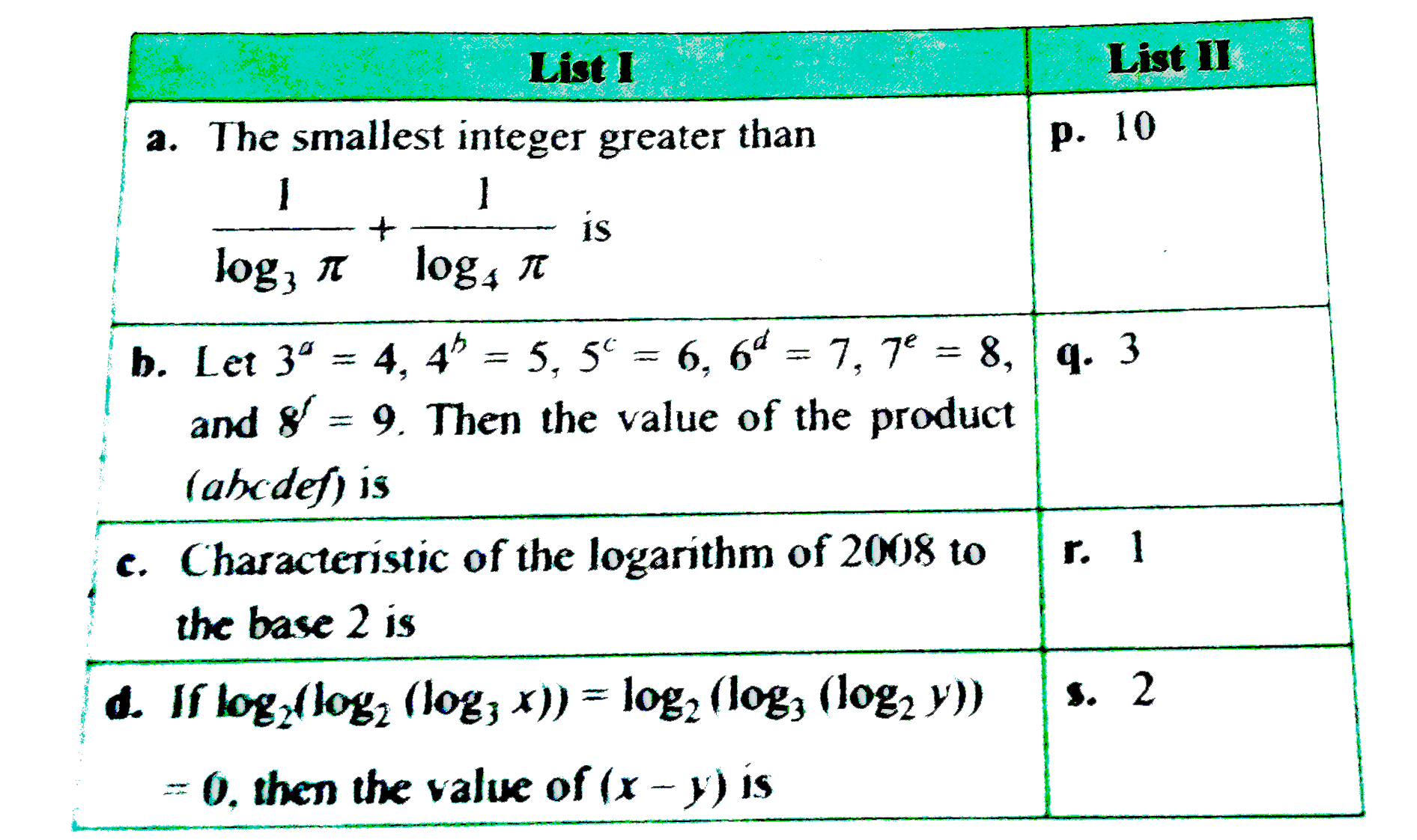If (log)ax=b for permissible values of aandx, then identify the statement(s) which can be correct. If aandb are two irrational numbers, then x can be rational. If a is rational and b is irrational, then x can be rational. If a is irrational and b is rational, then x can be rational. If aandb are rational, then x can be rational.Solution in Bengali
If a and b are two irrational numbers, then x can be retional.
If a is rational and b is irrational, then x can be rational.
If a is irrational and b is rational, then x can be rational.
If a and b are rational, then x can be rational.
The correct Answer is:A, B, C, D
logax=borx=ab
(1) For a=√2√2∉Qandb=√2∉Q,x=(√2√2)√2 which is rational.
(2) For a=2∈Qabdb=log23∉Q,x=3 which is rational.
(3) For a=√2andb=2,x=2
(4) The option is aboviously correct.
Topper's Solved these Questions
- BOOK - CENGAGE PUBLICATIONCHAPTER - LOGARITHM AND ITS PROPERTIESEXERCISE - Linked Comprehension Type6videos
LOGARITHM AND ITS PROPERTIES
- BOOK - CENGAGE PUBLICATIONCHAPTER - LOGARITHM AND ITS PROPERTIESEXERCISE - Matrix Match Type3videos
LOGARITHM AND ITS PROPERTIES
- BOOK - CENGAGE PUBLICATIONCHAPTER - LOGARITHM AND ITS PROPERTIESEXERCISE - Exercises (Single Correct Answer Type)50videos
LOGARITHM AND ITS PROPERTIES
- BOOK - CENGAGE PUBLICATIONCHAPTER - LOGARITHM AND ITS APPLICATIONS EXERCISE - Subjective Type9videos
LOGARITHM AND ITS APPLICATIONS
- BOOK - CENGAGE PUBLICATIONCHAPTER - MATHMETICAL REASONINGEXERCISE - Archives10videos
MATHMETICAL REASONING
Similar Questions
Consider the system of equations
log3(log2x)+log1/3(log1/2y)=1andxy2=9.
The value of 1/y lies in the interval02:39View SolutionMatch the following List I to List II
 02:39View Solution
02:39View Solution(log)418 is
03:33View SolutionFind the value of x satisfying the equations log3(log2x)+log1/3(log1/2y)=1 and xy2=9
04:18View SolutionStatements -1 : ~(p↔~q) is equivalent to p↔q
Statement-2: ~(p↔~q) is a tautology.02:53View SolutionIf (log)ax=b for permissible values of a and x, then identify the statement(s) which can be correct. (a)If a and b are two irrational numbers, then x can be rational. (b)If a is rational and b is irrational, then x can be rational. (c)If a is irrational and b is rational, then x can be rational. (d)if aandb are rational, then x can be rational.
01:48View Solutionif (log)ax=b for permissible values of a and x then identify the statements which can be correct.
(a) If a and b are two irrational numbers then x can be rational
(b) if a is rational and b is irrational, then x can be rational
(c) if a is irrational and b is rational, then x can be rational
(d) If a and b are two rational numbers then x can be rational .04:08View SolutionLet f:[a,b]rarr R be any function which is such that f(x) is rational for irrational x and that f(x) is irrational for rational x, then in [a,b]
04:34View SolutionWhich of the following is a correct statement?
(A)Sum of two irrational numbers is always irrational
(B) Sum of a rational and irrational number is always an irrational number
(C)Square of an irrational number is always an irrational number
(D) Sum of two rational numbers can never be an integer04:07View SolutionIf x is a rational number and y is an irrational number, then (a) both x + y and xy are necessarily rational (b) both x + y and xy are necessarily irrational (c) xy is necessarily irrational, but x + y can be either rational or irrational (d) x + y is necessarily irrational, but xy can be either rational or irrational
02:31View SolutionIf x is a rational number and y is an irrational number, then both x + y and xy are necessarily rational both x + y and xy are necessarily irrational xy is necessarily irrational, but x + y can be either rational or irrational x + y is necessarily irrational, but xy can be either rational or irrational
View SolutionIf (log)ax=b for permissible values of a and x, then identify the statement(s) which can be correct. (a)If a and b are two irrational numbers, then x can be rational. (b)If a is rational and b is irrational, then x can be rational. (c)If a is irrational and b is rational, then x can be rational. (d)if aandb are rational, then x can be rational.
01:45View SolutionIf (log)ax=b for permissible values of aandx, then identify the statement(s) which can be correct. If aandb are two irrational numbers, then x can be rational. If a is rational and b is irrational, then x can be rational. If a is irrational and b is rational, then x can be rational. If aandb are rational, then x can be rational.
02:04View Solutionif (log)ax=b for permissible values of a and x then identify the statements which can be correct. (a) If a and b are two irrational numbers then x can be rational (b) if a is rational and b is irrational, then x can be rational (c) if a is irrational and b is rational, then x can be rational (d) If a and b are two rational numbers then x can be rational .
04:09View SolutionWhich of the following is a correct statement?
(A)Sum of two irrational numbers is always irrational
(B) Sum of a rational and irrational number is always an irrational number
(C)Square of an irrational number is always an irrational number
(D) Sum of two rational numbers can never be an integer03:10View Solution(a) Find all rational values of x at which y=√x2+x+3 is a rational number.
(b) Prove that √2 is an irrational number.02:49View Solution

